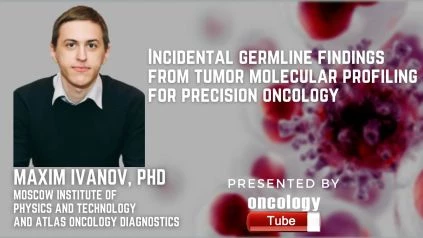Maxim Ivanov, Ph.D. at the Moscow Institute of Physics and Technology, Department of Biological and Medical Physics, Atlas Oncology Diagnostics. Speaks about the ESMO MAP 2021 Abstract – 13P – Incidental germline findings from tumor molecular profiling for precision oncology – is it common and how to manage.
Abstract:
Background:
A small percentage of patients who are referred for tumor-only complex molecular profiling may have germline mutations in genes linked to hereditary cancer syndromes (HCS). The treatment and reporting of such unintentional germline results are not standardized in bioinformatics.
Methods:
In order to detect germline variations in HCS-associated genes, data from NGS sequencing of tumor-only samples from patients submitted for complex molecular profiling were evaluated. Bioinformatic techniques were used to analyze the variant origin, followed by hand curation. If possible, the origin of the variation was confirmed using Sanger sequencing on normal tissue from the patients. The pathogenicity of the variants was determined using ACMG/AMP.
Results:
The researchers gathered NGS data from 183 patients (75 men [41.0 percent]; mean [SD] age, 57.7 [13.3] years). Colorectal cancer, pancreatic cancer, and lung cancer were the most prevalent tumor types (10 percent ). In genes linked to HCS, we discovered 56 sequencing variations in 40 individuals. 17 (14 patients) were projected to be of germline origin, with 6 pathogenic (PV) or probable pathogenic (LPV) mutations and 9 variants of unknown importance (VUS). For the 41 (97%) missense variations in HCS related genes, bioinformatics prediction of variant origin was consistent with manual curation. Based on our findings, we predict that Sanger sequencing using a patient’s normal tissue would be required in 1-7 percent of cases (PV or LPV detected in HCS genes), with 2-15 percent of cases requiring genetic counseling (PV, LPV or VUS found in HCS genes).
Conclusions:
In data from cancer patients referred for complex molecular profiling, identifying harmful germline mutations by chance is common. We offer a method for dealing with variations in genes linked to HCS.

